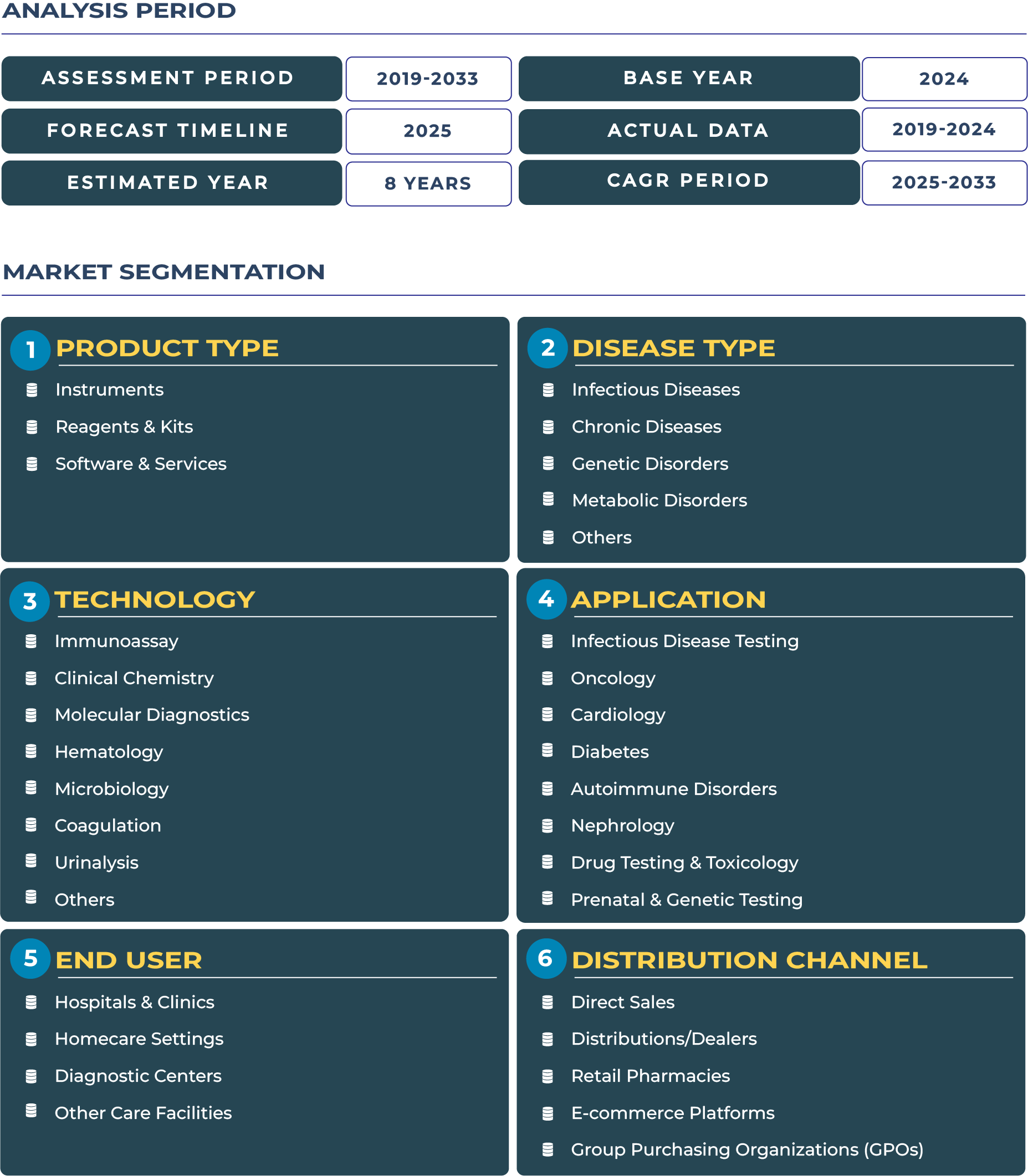Malaysia’s MedTech Magnetism: How Medical Tourism is Powering the In-Vitro Diagnostic Market Expansion
Malaysia’s transformation into a preferred destination for medical tourism has ignited a wave of opportunities across the In-vitro Diagnostic (IVD) market. The nation’s strategic healthcare policies, affordable treatment options, and internationally accredited hospitals have positioned it as a regional medical hub. This growing influx of international patients, particularly from neighboring ASEAN nations, the Middle East, and China, has intensified demand for high-quality diagnostic testing and precision-based treatment planning.
As Malaysia’s healthcare infrastructure becomes increasingly sophisticated, diagnostics form the backbone of patient care. The Malaysia In-vitro Diagnostic Market is projected to grow from USD 811.4 million in 2025 to USD 2,038.8 million by 2033, registering an impressive CAGR of 12.2% (2025, 2033). The surge is driven by rising healthcare awareness, early disease detection initiatives, and the expansion of laboratory automation and digital diagnostic technologies. Supportive regulatory oversight by the Ministry of Health Malaysia and the Malaysian Investment Development Authority (MIDA) continues to encourage private investment and innovation within the sector.
Malaysia IVD Market Outlook: Malaysia’s Diagnostic Future Anchored in Healthcare Tourism and Technological Modernization
Malaysia’s healthcare tourism sector, which generated over USD 400 million in 2024, is now seamlessly integrating advanced diagnostic technologies into its medical service chain. Hospitals in Kuala Lumpur, Penang, and Johor Bahru have adopted AI-assisted testing systems and point-of-care diagnostic devices to support rapid, precise analysis, especially for visiting patients seeking quick turnaround results. The IVD industry’s growing alignment with clinical laboratories, wellness centers, and specialized medical tourism packages has created a synergistic ecosystem between diagnostics and treatment.
Moreover, Malaysia’s position as a cost-effective alternative to Singapore and Thailand gives it a competitive advantage. The introduction of smart reagents, automation-ready diagnostic instruments, and integrated data platforms within private hospitals further enhances testing accuracy and workflow efficiency. Increasing collaborations with international firms such as Roche Diagnostics and Abbott Laboratories have boosted knowledge transfer and capacity building, fostering long-term sustainability in Malaysia’s diagnostic value chain.
Key Market Drivers and Restraints Defining Malaysia IVD Ecosystem
Driving Force: Medical Tourism Hub and Expanding Private Hospital Networks
The primary growth catalyst for Malaysia IVD market lies in its expanding private healthcare ecosystem. Over 220 private hospitals now provide advanced testing facilities and diagnostic solutions tailored to global medical tourists. The rising number of inbound patients seeking orthopedics, oncology, and cardiovascular treatments has increased the requirement for molecular diagnostics, immunoassays, and biochemistry analyzers. Government initiatives like Malaysia Healthcare Travel Council (MHTC) are also instrumental in promoting seamless cross-border healthcare travel and infrastructure investments in laboratory services.
Furthermore, the adoption of cloud-based laboratory information systems (LIS) and middleware software solutions has optimized efficiency across hospital networks. These digital upgrades are improving turnaround times, data accessibility, and quality assurance, aligning Malaysia’s diagnostics infrastructure with international best practices.
Restraints: Pricing Sensitivity and Regulatory Barriers
Despite its growth potential, Malaysia IVD market faces constraints. Price sensitivity in diagnostic testing limits the rapid adoption of premium products, particularly in public healthcare facilities. Additionally, regulatory compliance involving halal certification for reagents and medical products presents unique challenges to international manufacturers. The Department of Islamic Development Malaysia (JAKIM) oversees these requirements, ensuring cultural and ethical compatibility within clinical environments. Meanwhile, smaller laboratories face financial limitations in adopting advanced diagnostic automation, creating an uneven landscape between urban and rural diagnostic access.
Emerging Trends and Opportunities in Malaysia IVD Industry Landscape
Trend: Private Sector Investment and Hospital Modernization
Malaysia’s private healthcare sector is undergoing rapid digital transformation, with hospital groups investing in high-throughput analyzers and AI-powered pathology imaging. Kuala Lumpur and Selangor are witnessing rising demand for portable diagnostic instruments in outpatient settings. Public-private partnerships are also catalyzing expansion in diagnostic testing services, allowing smaller facilities to leverage national laboratory networks for improved service reach. Integration of e-health records and remote diagnostics platforms has made Malaysia’s healthcare ecosystem increasingly interoperable and data-driven.
Opportunity: Regional Manufacturing and Halal Diagnostic Solutions
The establishment of localized IVD manufacturing units provides a strategic opportunity for Malaysia to reduce import dependency and enhance self-reliance. The government’s medical device blueprint encourages technology transfer and joint ventures between domestic players and global firms. Additionally, Malaysia has the potential to lead the Southeast Asian region in developing halal-certified diagnostic reagents and assay kits, appealing to the Muslim-majority population across ASEAN and the Middle East. Local companies are focusing on developing cost-effective, export-ready solutions that meet both international quality standards and cultural expectations.
Competitive Landscape: Strategic Alliances and Localization Driving Market Consolidation
The Malaysia IVD industry is marked by active participation from international players like Roche Diagnostics, Abbott, Siemens Healthineers, and bioMérieux alongside domestic firms such as Medical Innovation Ventures (Mediven) and Chemopharm. Recent collaborations between global and Malaysian healthcare institutions have accelerated technology adoption. For instance, Abbott’s partnerships with Malaysian hospitals to deploy next-generation immunoassay analyzers (2024) highlight the shift toward precision diagnostics.
Strategically, companies are localizing packaging and adapting logistics to suit regional distribution hubs such as Penang and Johor. Partnerships with medical tourism operators to create bundled diagnostic packages have increased international patient volumes. The focus on integrated test solutions, automated quality assurance systems, and remote calibration support continues to drive market competitiveness, positioning Malaysia as a future-ready diagnostic hub within Asia-Pacific.







